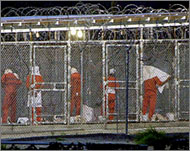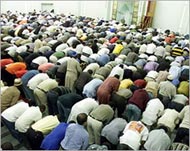Arrests cast shadow on US Muslims
A recent series of arrests and federal investigations into alleged terrorist-related activities involving Muslim Americans are casting an even larger shadow of suspicion over the US Islamic community, Muslim activists in Washington say.

Muslim Americans, still struggling to overcome the remnants of bigotry created by the 11 September 2001 attacks, are now facing a new surge of guilt-by-association tactics by federal law-enforcement agencies, according to representatives from several of the largest Muslim advocacy organizations.
“The American Muslim community has already been under suspicion since 9/11 and this just adds to our burden,” said Rabiah Hamed, a spokeswoman for the Council on American-Islamic Relations (CAIR), a DC-based Muslim group.
The hits keep coming one after the other.
High profile arrests
Just recently, Abd al-Rahman al-Amoudi, founder of the American Muslim Council (AMC) and one of the most prominent US Muslim leaders, was arrested and charged with accepting illegal funds from the Libyan government in exchange for his attempts to lobby the Bush administration to lift US sanctions against that country.
 |
|
Muslim Imam providing religious |
That followed the high-profile arrest of an Islamic chaplain in the US Army who is suspected of providing illegal assistance to al-Qaida detainees he was ministering to at Guantanamo Bay, Cuba.
This past summer, 11 Muslim men in Northern Virginia, including nine Americans, were charged with conspiring to support a “terrorist jihad” in Pakistan, Afghanistan and other foreign countries. Four of the individuals have already pleaded guilty to preparing to fight for potentially violent Muslim causes overseas.
And just last week, The Washington Post ran a front page story documenting a wide-spread investigation by the FBI of what is described as a possible multi-state “terrorist network” set up by “Wahhabi” Islamic organizations.
While the majority of these individuals have yet to be convicted of any crime, Muslim activists say the US government is putting heat on all Muslim Americans by accusing so many Islamic suspects of terrorist actions.
Siege mentality
“I would say that the community does feel like it’s under siege…There’s been a disparity between the administration’s actions and its words,” Hamed said.
|
“I’m concerned with the manner in which the investigation into terrorism is going in this country. This Justice Department (DOJ) has a one-size-fits-all policy” Mahdi Bray, |
Mahdi Bray, the executive director of the Muslim American Society Freedom Foundation in Washington, DC, said the Bush administration is pursuing a dangerously broad crackdown on Muslims in general, a bi-product of the war on “terrorism”.
“I’m concerned with the manner in which the investigation into terrorism is going in this country,” he said. “This Justice Department (DOJ) has a one-size-fits-all policy.”
While a small number of the suspects have pleaded guilty to various criminal charges, Bray pointed out that a June report issued by the Justice Department’s inspector general harshly criticized the DOJ for detaining hundreds of Muslim suspects, most of them illegal immigrants who turned out to have no connections to “terrorism”.
But in a war against “Islamic extremists” that many Americans consider to be a fight for survival, how far can the government go to protect is citizens without violating the civil rights of one religious group?
It’s a debate the Bush administration has been unable to win in the minds of many Muslim Americans since the 9/11 attacks.
Civil liberties ignored
Yet, not everyone is so preoccupied with civil liberties. Some just want the United States to do whatever it takes to defeat the “terrorists”.
|
“By pretending not to see that the enemy emerges from one source, the authorities dilute their focus, render their review nearly meaningless and endanger security” Daniel Pipes, |
Daniel Pipes, director of the Middle East Forum and a controversial new member of the board of the US Institute for Peace, wrote in a recent New York Post column that cases such as the arrest of the Muslim chaplain at Guantanamo Bay show that “militant” Islamists are the central threat to US national security. Ignoring that reality would be political correctness run amok, he said.
“By pretending not to see that the enemy emerges from one source, the authorities dilute their focus, render their review nearly meaningless and endanger security,” he said.
However, just because the 9/11 attacks were committed by Islamic radicals doesn’t mean that “terrorism” is a problem exclusive to the Muslim community, Bray said.
“Terrorism is a global phenomenon,” he said. “It’s not something linked to a certain ethnic region or religion.”
Public scares
|
|
|
President George Bush after |
Misinformation and a lack of education on the Islamic faith have allowed the US government to scare the general public into accepting new draconian law-enforcement policies such as the Patriot Act, Bray emphasied.
The investigation into the supposed “Wahhabi terrorist network” is being conducted by officials who have taken extreme examples of Wahhabism, a Muslim school of thought, to justify condemning the entire movement as militant, he added.
In a written press statement, Republican senator John Kyle from Arizona equated all of Wahhabism with “terrorist” behaviour.
“This sect, commonly referred to as Wahhabism, preaches jihad against Christian, Jews, and Muslims who don’t toe the Wahhabi line,” Kyle said.
“All 19 of the September 11 hijackers were followers of Wahhabism, as is Usama bin Ladin. This violent perversion of Islamic faith has been responsible for terrorist attacks against innocent civilians – both Muslim and non-Muslim – all over the world.”
While some followers of Wahhabism may advocate violence against what they consider to be “infidels,” it’s unfair to think that all conservative Muslims yearn to “fly planes into a building,” Bray countered.
“I’m not so naïve as not to think that there are some people who’ve developed a bad understanding of Islam… But I don’t think it’s fair to malign a legitimate school of Islamic jurisprudence,” he said.
Just the use of the word “Wahhabi” is playing into the hands of government officials who after 9/11 utilized buzzwords such as “jihad” to castigate terrorist suspects in the eyes of the American people, Hamed said.
“If you say the word enough and it constitutes a bad meaning in the public, then it will be easier to demonise legitimate organisations,” she said.
Guilt-by-association
 |
|
Many US Muslims feel targeted |
Certainly, if well-known Muslim American leaders such as al-Amoudi are linked with terrorist activities, other Muslims will suffer by direct or indirect association—a lesson already learned by Kamal Nawash, a Republican candidate for the Virginia state senate.
Weeks before his arrest, Nawash decided to return $10,000 worth of campaign contributions from al-Amoudi, not wanting his efforts to be “distracted” by some of al-Amoudi’s more controversial statements in the past.
Yet after the arrest, The Washington Post learned of the contributions and published a story about the link between the two men, something Nawash fears will damage his campaign.
“In many ways it’s just a case of bad luck,” Nawash said.
Before al-Amoudi’s arrest he said he struggled to convince the local media to cover his campaign, but after the scandal broke, “I got a call every five minutes.” Nawash said he questions whether newspapers such as The Washington Post are only interested in stories about the Muslim community if they’re connected to terrorism.
“I do think that the media thinks these stories are very juicy and go after them,” he said.
But he’s also angry with the small faction of Islamic extremists around the world whose “terrorist-related” actions poison the image of patriotic, law-abiding Muslim Americans, he said.
For now, it seems that the continuing struggles of Arab and Muslim Americans and their outcomes will determine how true America stays to its democratic principles in the current atmosphere of fear.
